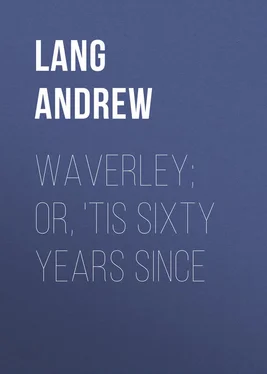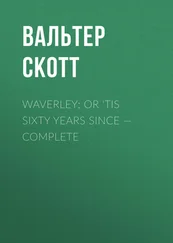Andrew Lang - Waverley; Or, 'Tis Sixty Years Since
Здесь есть возможность читать онлайн «Andrew Lang - Waverley; Or, 'Tis Sixty Years Since» — ознакомительный отрывок электронной книги совершенно бесплатно, а после прочтения отрывка купить полную версию. В некоторых случаях можно слушать аудио, скачать через торрент в формате fb2 и присутствует краткое содержание. Издательство: Иностранный паблик, Жанр: foreign_antique, foreign_prose, на английском языке. Описание произведения, (предисловие) а так же отзывы посетителей доступны на портале библиотеки ЛибКат.
- Название:Waverley; Or, 'Tis Sixty Years Since
- Автор:
- Издательство:Иностранный паблик
- Жанр:
- Год:неизвестен
- ISBN:нет данных
- Рейтинг книги:4 / 5. Голосов: 1
-
Избранное:Добавить в избранное
- Отзывы:
-
Ваша оценка:
- 80
- 1
- 2
- 3
- 4
- 5
Waverley; Or, 'Tis Sixty Years Since: краткое содержание, описание и аннотация
Предлагаем к чтению аннотацию, описание, краткое содержание или предисловие (зависит от того, что написал сам автор книги «Waverley; Or, 'Tis Sixty Years Since»). Если вы не нашли необходимую информацию о книге — напишите в комментариях, мы постараемся отыскать её.
Waverley; Or, 'Tis Sixty Years Since — читать онлайн ознакомительный отрывок
Ниже представлен текст книги, разбитый по страницам. Система сохранения места последней прочитанной страницы, позволяет с удобством читать онлайн бесплатно книгу «Waverley; Or, 'Tis Sixty Years Since», без необходимости каждый раз заново искать на чём Вы остановились. Поставьте закладку, и сможете в любой момент перейти на страницу, на которой закончили чтение.
Интервал:
Закладка:
“Although there are characters sufficient to awaken the attention and to diversify the scenes, yet they are not in sufficient number to perplex the memory or to confuse the incidents. Their spirit is well kept up till the very last, and they relieve one another with so much art that the reader will not find himself wearied even with the pedantic jargon of the old Baron of Bradwardine.
“Of Waverley himself we shall say but little, as his character is far too common to need a comment; we can only say that his wanderings are not gratuitous, nor is he wavering and indecisive only because the author chooses to make him so. Every feature in his character is formed by education, and it is to this first source that we are constantly referred for a just and sufficient cause of all the wandering passions as they arise in his mind.
“The secondary personages are drawn with much spirit and fidelity, and with a very striking knowledge of the peculiarities of the Scotch temper and disposition. The incidents are all founded on fact, and the historical parts are related with much accuracy. The livelier scenes which are displayed are of the most amusing species, because they flow so naturally from the personages before us that the characters, not the author, appear to speak. A strong vein of very original humour marks the whole: in most instances it is indeed of a local and particular nature, but in many cases it assumes a more general appearance.
“Of the more serious portions we can speak with unqualified approbation; the very few pathetic scenes which occur are short, dignifed, and affecting. The love-scenes are sufficiently contracted to produce that very uncommon sensation in the mind, – a wish that they were longer.
“The religious opinions expressed in the course of the tale are few, but of those few we fully approve.
“The humorous and happy adaptation of legal terns shows no moderate acquaintance with the arcana of the law, and a perpetual allusion to the English and Latin classics no common share of scholarship and taste.”
The “Scots Magazine” illustrated the admirable unanimity of reviewers when they are unanimous. The “Anti-Jacobin” objected that no Chateau-Margaux sent in the wood from Bordeaux to Dundee in 1713 could have been drinkable in 1741. “Claret two-and-thirty years old! It almost gives us the gripes to think of it.” Indeed, Sir Walter, as Lochhart assures us, was so far from being a judge of claret that he could not tell when it was “corked.” One or two points equally important amused the reviewer, who, like most of his class, detected the hand of Scott. There was hardly a possibility, as Mr. Morritt told Sir Walter, “that the poems in ‘Waverley’ could fail to suggest their author. No man who ever heard you tell a story over a table but must recognize you at once.” To his praise of “Waverley” Mr. Morritt hardly added any adverse criticism, beyond doubting the merit of the early chapters, and denouncing the word “sombre” as one which had lately “kept bad company among the slipshod English of the sentimental school.” Scott, in defence, informed Mr. Morritt that he had “left the story to flag in the first volume on purpose… I wished (with what success Heaven knows) to avoid the ordinary error of novelists, whose first volume is usually their best.”
It must be admitted that if Scott wished to make “Waverley” “flag” in the beginning, he succeeded extremely well, – too well for many modern readers, accustomed to a leap into the midst of the story. These introductory chapters,” he observes in a note on the fifth of them, “have been a good deal censured as tedious and unnecessary; yet there are circumstances recorded in them which the Author has not been able to persuade himself to retract or cancel.” These “circumstances” are probably the studies of Waverley, his romantic readings, which are really autobiographic. Scott was, apparently, seriously of opinion that the “mental discipline” of a proper classical education would have been better for himself than his own delightfully desultory studies. Ballantyne could not see what Waverley’s reading had to do with his adventures and character. Scott persisted in being of another mind. He himself, writing to Morritt, calls his hero “a sneaking piece of imbecility;” but he probably started with loftier intentions of “psychological analysis” than he fulfilled. He knew, and often said, in private letters, as in published works, that he was no hand at a respectable hero. Borderers, buccaneers, robber, and humorsome people, like Dugald Dalgetty and Bailie Nicol Jarvie and Macwheeble, whom he said he preferred to any person in “Waverley,” were the characters he delighted in. We may readily believe that Shakspeare too preferred Jacques and the Fat Knight to Orlando or the favoured lover of Anne Page. Your hero is a difficult person to make human, – unless, indeed, he has the defects of Pendennis or Tom Jones. But it is likely enough that the Waverley whom Scott had in his mind in 1805 was hardly the Waverley of 1813. His early English chapters are much in the ordinary vein of novels as they were then written; in those chapters come the “asides” by the author which the “Edinburgh Review” condemned. But there remains the kindly, honourable Sir Everard, while the calm atmosphere of English meadows, and the plump charms of Miss Cecilia Stubbs, are intended as foils to the hills of the North, the shy refinement of Rose, and the heroic heart of Flora Mac-Ivor. Scott wished to show the remote extremes of civilization and mental habit co-existing in the same island of Scotland and England. Yet we regret such passages as “craving pardon for my heroics, which I am unable in certain cases to resist giving way to,” and so forth. Scott was no Thackeray, no Fielding, and failed (chiefly in “Waverley”) when he attempted the mood of banter, which one of his daughters, a lady “of Beatrice’s mind,” “never got from me,” he observes.
In any serious, attempt to criticise “Waverley” as a whole, it is not easy to say whether we should try to put ourselves at the point of view of its first readers, or whether we should look at it from the vantage-ground of to-day. In 1811 the dead world of clannish localty was fresh in many memories. Scott’s own usher had often spoken with a person who had seen Cromwell enter Edinburgh after Dunbar. He himself knew heroes of the Forty-five, and his friend Lady Louisa Stuart had been well acquainted with Miss Walkinshaw, sister of the mistress of Charles Edward. To his generation those things were personal memories, which to us seem as distant as the reign of Men-Ka-Ra. They could not but be “carried off their feet” by such pictures of a past still so near them. Nor had they other great novelists to weaken the force of Scott’s impressions. They had not to compare him with the melancholy mirth of Thackeray, and the charm, the magic of his style. Balzac was of the future; of the future was the Scott of France, – the boyish, the witty, the rapid, the brilliant, the inexhaustible Dumas. Scott’s generation had no scruples about “realism,” listened to no sermons on the glory of the commonplace; like Dr. Johnson, they admired a book which “was amusing as a fairy-tale.” But we are overwhelmed with a wealth of comparisons, and deafened by a multitude of homilies on fiction, and distracted, like the people in the Erybyggja Saga, by the strange rising and setting, and the wild orbits of new “weirdmoons” of romance. Before we can make up our minds on Scott, we have to remember, or forget, the scornful patronage of one critic, the over-subtlety and exaggerations of another, the more than papal infallibility of a third. Perhaps the best critic would be an intelligent school-boy, with a generous heart and an unspoiled imagination. As his remarks are not accessible, as we must try to judge “Waverley” like readers inured to much fiction and much criticism, we must confess, no doubt, that the commencement has the faults which the first reviewers detected, and it which Scott acknowledged. He is decidedly slow in getting to business, as they say; he began with more of conscious ethical purpose than he went on, and his banter is poor. But when once we enter the village of Tully-Veolan, the Magician finds his wand. Each picture of place or person tells, – the old butler, the daft Davie Gellatley, the solemn and chivalrous Baron, the pretty natural girl, the various lairds, the factor Macwheeble, – all at once become living people, and friends whom we can never lose. The creative fire of Shakspeare lives again. The Highlanders – Evan Dhu, Donald Bean Lean, his charming daughter, Callum Beg, and all the rest – are as natural as the Lowlanders. In Fergus and Flora we feel, indeed, at first, that the author has left his experience behind, and is giving us creatures of fancy. But they too become human and natural, – Fergus in his moods of anger, ambition, and final courageous resignation; Flora, in her grief. As for Waverley, his creator was no doubt too hard on him. Among the brave we hear that he was one of the bravest, though Scott always wrote his battlepieces in a manner to suggest no discomfort, and does not give us particular details of Waverley’s prowess. He has spirit enough, this “sneaking piece of imbecility,” as he shows in his quarrel with Fergus, on the march to Derby. Waverley, that creature of romance, considered as a lover, is really not romantic enough. He loved Rose because she loved him, – which is confessed to be unheroic behaviour. Scott, in “Waverley,” certainly does not linger over love-scenes. With Mr. Ruskin, we may say: “Let it not be thought for an instant that the slight and sometimes scornful glance with which Scott passes over scenes, which a novelist of our own day would have analyzed with the airs of a philosopher, and painted with the curiosity of a gossip, indicates any absence in his heart of sympathy with the great and sacred elements of personal happiness.” But his mind entertained other themes of interest, “loyalty, patriotism, piety.” On the other hand, it is necessary to differ from Mr. Ruskin when he says that Scott “never knew ‘l’amor che move ‘l sol e l’ altre stelle.’” He whose heart was “broken for two years,” and retained the crack till his dying day, he who, when old and tired, and near his death, was yet moved by the memory of the name which thirty years before he had cut in Runic characters on the turf at the Castle-gate of St. Andrew, knew love too well to write of it much, or to speak of it at all. He had won his ideal as alone the ideal can be won; he never lost her: she was with him always, because she had been unattainable. “There are few,” he says, “who have not, at one period of life, broken ties of love and friendship, secret disappointments of the heart, to mourn over, – and we know no book which recalls the memory of them more severely than ‘Julia de Roubigne.’” He could not be very eager to recall them, he who had so bitterly endured them, and because he had known and always knew “l’amor che move ‘l sol e l’altre stelle,” a seal was on his lips, a silence broken only by a caress of Di Vernon’s.’
Читать дальшеИнтервал:
Закладка:
Похожие книги на «Waverley; Or, 'Tis Sixty Years Since»
Представляем Вашему вниманию похожие книги на «Waverley; Or, 'Tis Sixty Years Since» списком для выбора. Мы отобрали схожую по названию и смыслу литературу в надежде предоставить читателям больше вариантов отыскать новые, интересные, ещё непрочитанные произведения.
Обсуждение, отзывы о книге «Waverley; Or, 'Tis Sixty Years Since» и просто собственные мнения читателей. Оставьте ваши комментарии, напишите, что Вы думаете о произведении, его смысле или главных героях. Укажите что конкретно понравилось, а что нет, и почему Вы так считаете.












